Getting your Trinity Audio player ready...
We are proud to present the results of Odgers Berndtson's 2025 CEO Survey under the headline "Leadership in Turbulent Times: Balancing Hope and Hurdles." The survey was conducted by our Partners, Merete Søby and Søren Rysholt Christiansen, and offers a unique insight into how Denmark's top CEOs navigate a world marked by uncertainty and change.
Introduction
- In early spring 2025, Odgers Berndtson invited Denmark’s top CEOs to participate in the annual Odgers Berndtson Executive Management Survey.
The survey is concentrated on three current and highly important financial, leadership and company specific topics. The survey has been adjusted with the most relevant topics right now: - All responses have been kept confidential.
We thank you for your participation and encourage you to contact us with any questions you may have.
Executive Summary
Key findings
- Continued positive revenue expectations, as 90,1% of the respondents expect growth in 2025. Despite concerns about the new US administration’s impact on the companies, 56,7% expect a growth of 5-10%, which is a significant increase since 2023 and 2024 where only 25% and 22,7% respectively expected this level of revenue growth.
- 60% of the surveyed CEOs expect policies and actions of the new US administration to have a negative impact on their companies globally.
- Management sparring is seen as the key area where the Board of Directors could contribute even more.
Current geopolitical situation
- 63,4% expect revenue growth of more than 5% with only 6,7% of the respondents expecting decline.
- 33,3% anticipate their company’s level of involvement in the United States to decrease over the next year due to the new US administration.
- 56,6% of the respondents expect their company to increase the pace regarding the green transition compared to 2024.
People & leadership
- 69% state Management skills as the main criteria when recruiting new executive team members, as well as the ability to create results and a strategic understanding being among the main criteria.
Acquiring top talent for C-level positions continuous to grow as a strategic focus area.
Board collaboration
- 62,1% see areas where their Board of Directors could contribute even more.
- 37,9% do not believe that their Board of Directors has the relevant competencies.
Revenue Expectations
Which level of revenue growth do you expect of
your company in 2025?
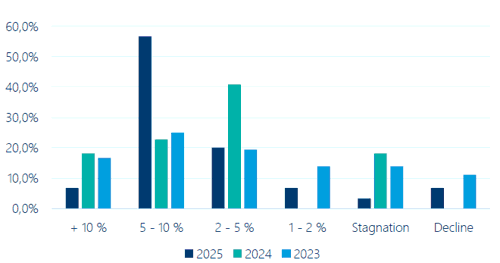
- Among the surveyed CEOs, 90,1% expect revenue growth in 2025, and 56,7% expect
revenue growth of 5-10%. Thus, revenue expectations are more than double as high
compared to 2023 and 2024. - Furthermore, 6,7% of the surveyed CEOs expect a decline in revenue 2025 whereas the
equivalent number was 0% in 2024, and 11,1% in 2023. - Overall, the global economy in 2025 is expected to navigate a complex landscape of taxes
and tariffs, inflation management, geopolitical uncertainties and technological
advancements.
Involvement in the US
How do you anticipate the new US administration
will impact your company’s level of involvement
in the United States over the next 12 months?
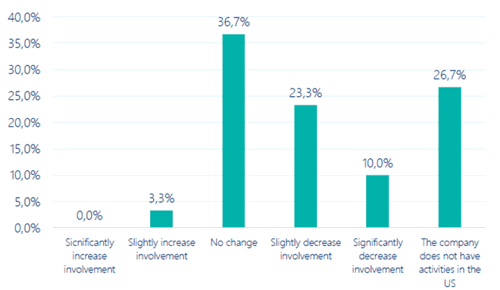
- Among the surveyed CEOs, 1 out of 3 expect their company’s level of involvement in the
United States to decrease over the next 12 months due to the new US administration.
36,7% expect no change, and only 3,3% anticipate an increased involvement. - Overall, very few of the surveyed CEOs expect to increase involvement in the United
States in 2025.
Current Affairs
Your position on events and incidents happening
at the present time
Artificial Intelligence
- 20% of respondents expect that generative AI will increase
headcount, due to the need for new skills. This is an increase
compared to 2024, where only 5% expected generative AI to increase
headcount. - 3,3% expect a decrease in headcount due to generative AI, and the
operational efficiency obtained. This number was 45% in 2024. - 76,7% expect no significant impact in headcount due to generative
AI.
International Talent
- 63,4% of respondents see a need in their company for greater and
easier access to international talent. - The majority of these respondents
find this to be an important factor here and now, while the remaining
expect it to become important in the longer term. - This is only a slight
decrease compared to 2024 where 68,2% of respondents saw this need. - 36,6% of respondents do not have any immediate needs for greater and
easier access to international talent.
Layoffs
- 20% of respondents anticipate that their company will likely initiate
one or more rounds of layoffs during 2025. This is a decrease
compared to 2024, where 31,8% anticipated to initiate layoffs. - 53,3% of respondents do not find it likely that their company will
initiate layoffs, and 26,7% are undecided about this.
Green Transition
- 56,6% of respondents expect their company to increase the pace
regarding the green transition compared to 2024. - 33,3% expect no
change, while 10% expect a decrease in the pace compared to 2024. - Despite challenging times, most companies continue to take part in
the green transition
Recruitment
Please state the main criteria when recruiting new members of the Executive Management Team
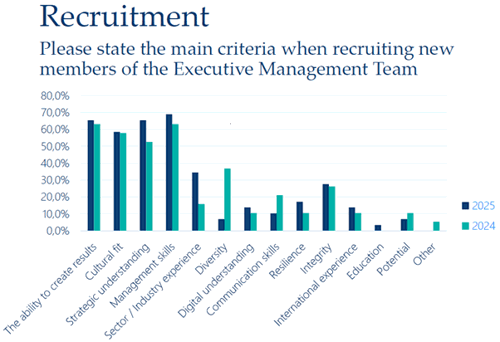
- Overall, when recruiting new members of the Executive Management Team, it is considered
particularly important to look for candidates with management skills as well as a strategic
understanding. In addition to that, the ability to create results and possession of cultural fit are also
considered important. - This question has been included in the Odgers Berndtson Executive Management Survey since
2005, and the ability to create results has always been a top criteria. - Management skills has slightly increased its importance and has grown from 51,5% in 2023 to
63,2% in 2024 to 69% in 2025 – potentially an indication that uncertain times require a stronger
managerial toolbox.
The results show an increase in the importance of having a strategic understanding from 52,6% in
2024 to 65,5% in 2025. - Furthermore, new members of the Executive Management Team should also be a good cultural fit.
They should share the company’s values and vision and be able to work collaboratively with
others. - From 2024 to 2025 sector/industry experience has increased from 15,5% to 34,5%, while diversity
has decreased from 36,8% to 6,9%. This makes diversity the criteria that seems to have changed its
importance the most over the past year. - Note: The respondents were able to choose 4 out of 13 criteria. The most notable have been included in the graph above.
The surveyed CEOs believe the following competencies will grow in importance when recruiting new members of the Executive Management team:
- Change readiness
- Resilience
- People skills and holistic thinking
- Open-mindedness
- Ability to mobilize and empower
- Integrity and responsibility
- Strategic understanding
- Ability to create results
- Digital understanding
- Leadership skills
- Resilience
- Risk management
- Change management
- Business development
- Transformation and execution
- Diversity
Relevant experience
In 2024 the surveyed CEOs believed the competencies that would grow in importance were:
- Managing an increasingly diverse workforce
- Digital understanding
- Ability to understand and use AI
- Leadership skills
- Strategic experience
- International profile
Talent Acquisition
To which degree has C-level talent acquisition grown as a strategic focus area in the recent years?
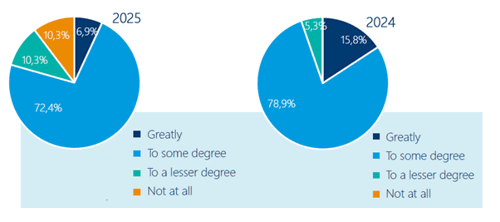
- The importance of acquiring top talent for C-level positions has always been recognized,
but in recent years, it has become an even greater priority. Thus, most respondents believe
that C-level talent acquisition has grown as a strategic focus area in recent years. However,
this proportion has slightly decreased over the past year. - According to 10,3% of the
respondents, C-level talent acquisition has not grown in importance in the recent years.
Nevertheless, we see C-level talent acquisition as crucial for companies’ ability to
navigating challenges, driving growth, and achieving long-term strategic objectives. - It is worth noticing that 48,3% of respondents have a succession plan for the Executive
Management Team – which conversely means that 51,7% do not have such a plan in place. - Having a succession plan in place is often seen as being essential for ensuring long-term
stability, fostering talent development, and maintaining strategic continuity – and
furthermore as a critical component of effective corporate governance and risk
management, contributing to the overall resilience and success of the organization. - Odgers has long-term experience in helping clients with their succession
planning in the form of assessments, talent mapping, and longlists of potential candidates.
Board Contribution
Do you see areas where the Board of Directors
could contribute even more?
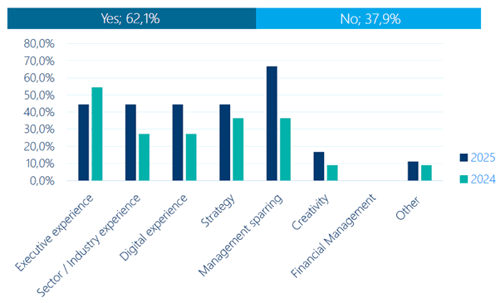
- The Board of Directors play a critical role in the success of an organization, and more than half
(62,1%) of the surveyed CEOs see areas where the board could contribute even more. - The most sought-after factor here is management sparring. Out of the 62,1% who find that the Board
of Directors could contribute more, 66,7% seek more contribution in this area. This is up from 36,4%
in 2024, where executive experience was the most sought-after contribution. - Out of the 62,1% who find that the Board of Directors could contribute more, 44,4% find executive
experience, sector/industry experience, digital experience, and strategy to be areas where the Board
of Directors could contribute even more. - Overall, a well-functioning Board of Directors is essential for the health and success of a company.
Their oversight, guidance, and strategic input are vital for ensuring that the company not only
achieves its short-term goals but also positions itself for long-term sustainability and growth.
Board Competencies
Do you believe that your board has the relevant
competencies?
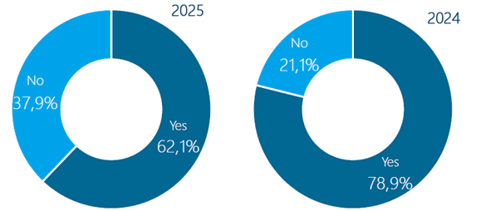
- Among the surveyed CEOs, around 6 out of 10 believe that their Board of Directors has the
relevant competencies. This is a decrease compared to 2024 where around 8 out of 10 believed
that their Board of Directors had the relevant competencies.
Conversely this means that in 2025 around 4 out of 10 do not believe that the Board of Directors
have the relevant competencies.
When asking those who respond ‘No’ (37,9%) to the question, they highlight
- C-level experience
- Digital- and external IT experience
- Competencies within AI
- Commercial experience
- Competencies within Human Resources
- ESG agenda
- Green transformation
- Strategy
as some of competencies they would like added to their boards.
- By ensuring that board members possess the relevant competencies, companies can enhance their
governance, make more informed decisions, and drive long-term success. - It is worth noting that 53,6% of the surveyed CEOs’ companies conduct systematic and regular
board evaluations and assessments.
About Odgers
- Odgers is Europe’s 2nd largest executive search company with more than 61 offices in 29 countries and with more than 250 partners.
- The company has existed in Denmark since 1979 and is one of Denmark’s leading executive search companies.
- We offer top management recruitment, assessment, and development.
- We work closely with companies, organizations, and authorities to find the best candidates who can lead and create results.
Executive Management Survey
"Leadership in Turbulent Times: Balancing Hope and Hurdles."



